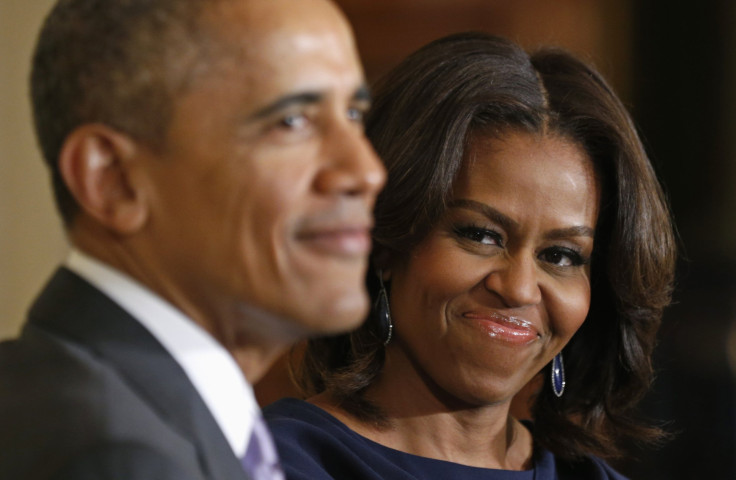Is Michelle Obama Going To Nigeria? US President Sending American Delegation to Buhari's Inauguration

UPDATE 12:20 p.m. ET: Michelle Obama will not attend Muhammadu Buhari's presidential inauguration in Nigeria on May 29, the White House said. "The First Lady will not be traveling to Nigeria," Caroline Adler, communications director in the first lady's office, said in an email Thursday.
Original post:
U.S. President Barack Obama will not attend Nigeria’s presidential inauguration on May 29, but his wife, Michelle Obama, is said to be among an American delegation that will go in his place. Other senior White House officials including Vice President Joe Biden and Secretary of State John Kerry could also be chosen to attend Muhammadu Buhari’s induction ceremony, according to media reports.
Nigeria’s ambassador to the United States, Ade Adefuye, confirmed with local media that outgoing Nigerian President Goodluck Jonathan had extended an invitation to the U.S. government for Buhari’s inauguration, and a senior official is expected to lead the American delegation. “I have been told that there would be an unusually large American delegation that will attend the presidential inauguration on May 29,” Adefuye told Premium Times newspaper in Abuja. “Nigeria’s profile has been on the rise since after the election, with the concession by Jonathan and the smooth transition that is going on.”
The Obama administration showed particular interest in the success of Nigeria’s elections and senior U.S. officials had denounced potential election-related violence, which marred Nigerian polls in the past. Obama himself urged Nigerian voters to insist on credible elections. Immediately after the general elections, he congratulated the West African nation on “the strength of Nigeria’s commitment to democratic principles.”
“While far from perfect, the March 28 elections were the best since Nigeria’s restoration of civilian government in 1999,” John Campbell, the Ralph Bunche senior fellow for Africa policy studies at the Council on Foreign Relations, wrote in a blog post Wednesday. “Now, in the aftermath of the March 28 elections, it would be appropriate for the president to visit Nigeria, perhaps in conjunction with his July visit to Kenya for the Global Entrepreneurship Summit in Nairobi.”
The U.S. president often sends a delegation to the presidential inaugurations of friendly nations, but the group is usually led by the American ambassador in that country. Senior government officials are sometimes chosen to lead the delegation to illustrate a special emphasis on the relationship between the two nations.
In the last few years, Obama has met with Jonathan in Washington and New York, and Kerry has visited the Jonathan administration in Abuja. Last December, Jonathan canceled U.S. Army training for the Nigerian army, which was intended to help the troops fight Boko Haram insurgents in northeast Nigeria. Buhari, who defeated Jonathan in the presidential election by a couple million votes, has said he would like to restore military ties with the United States.
“My administration will welcome the resumption of a military training agreement with the United States, which has halted during the previous administration,” Buhari wrote in an op-ed for the New York Times last month. “We must, of course, have better coordination with the military campaigns our African allies, like Chad and Niger, are waging in the struggle against Boko Haram. But, in the end, the answer to this threat must come from within Nigeria.”
© Copyright IBTimes 2024. All rights reserved.











